
A recent study found antibiotic resistant pathogens in an Ireland hopsital’s wastewater systems. Researchers at University Hospital Limerick performed an extensive analysis of the wastewater system, which experienced multiple HAI outbreaks. DNA was extracted from 20 pipe samples from hospital facilities, including sinks, toilets, and showers.
Antimicrobial resistome analysis of metagenomic fully assembled genomes (MAGs) was conducted, and a total of 469 MAGs were found in the extracted samples. Further analysis revealed a diverse range of antimicrobial resistant genes (ARG), which resisted treatments with tetracyclines and fluoroquinolones. These resistant bacteria could spread throughout the hospital, putting all patients at risk of infection.
This study was the first to reveal the microbial life inside the hospital, and helped provide strategies for disease control teams. To combat this crisis, hospitals must follow disease prevention regulations. Wastewater and plumbing systems are interconnected, so core practices such as decontamination and sterilization must be implemented to prevent the spread of infections throughout the hospital. If we can stop the pathway linked to the spread of these pathogens, we can effectively prevent patients from getting difficult-to-treat infections.
By Avanthi Krishnan
